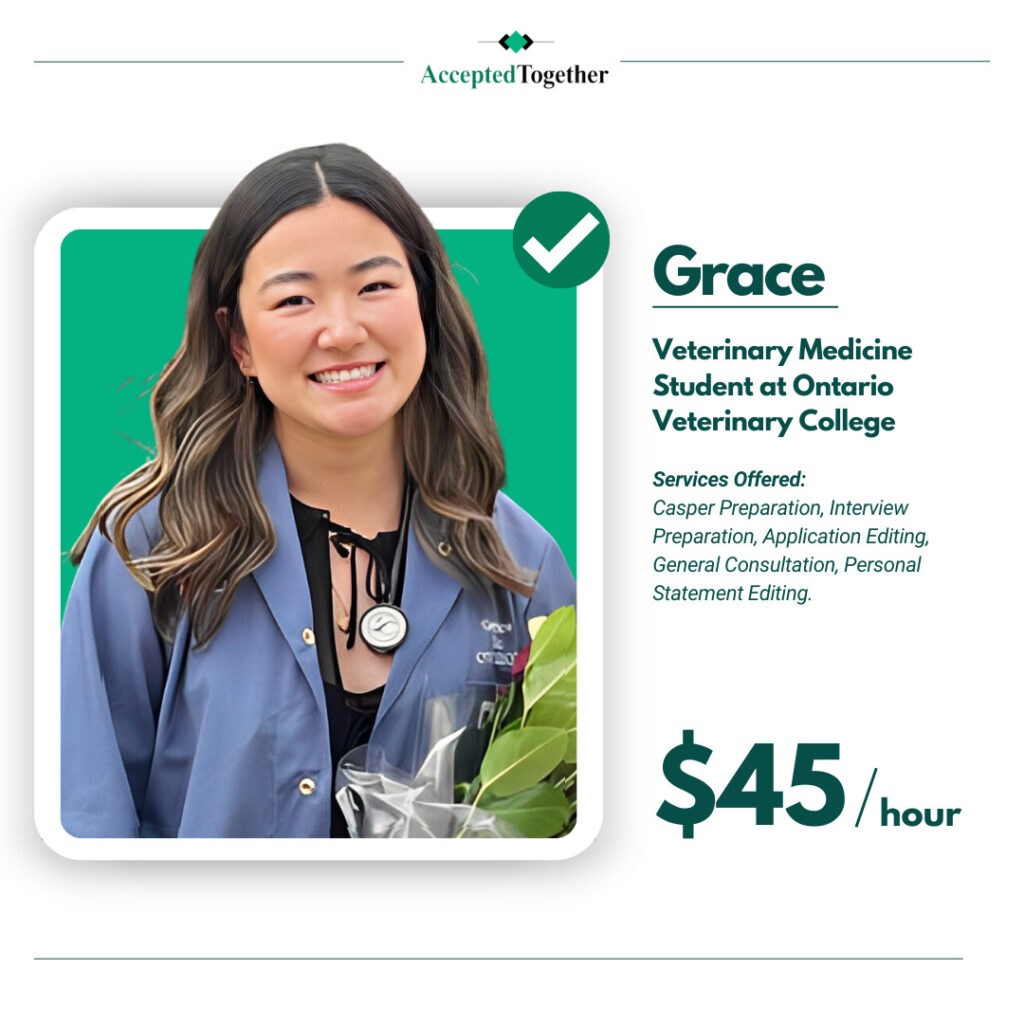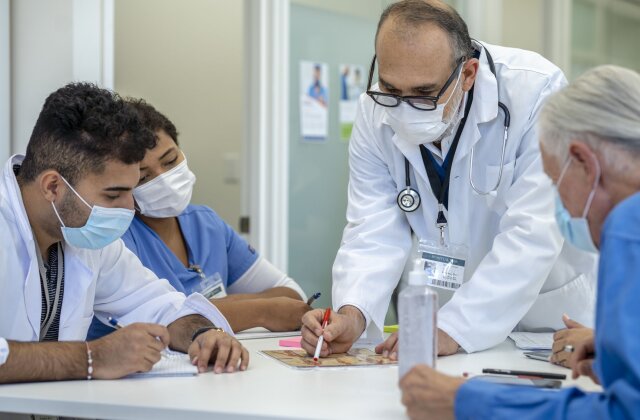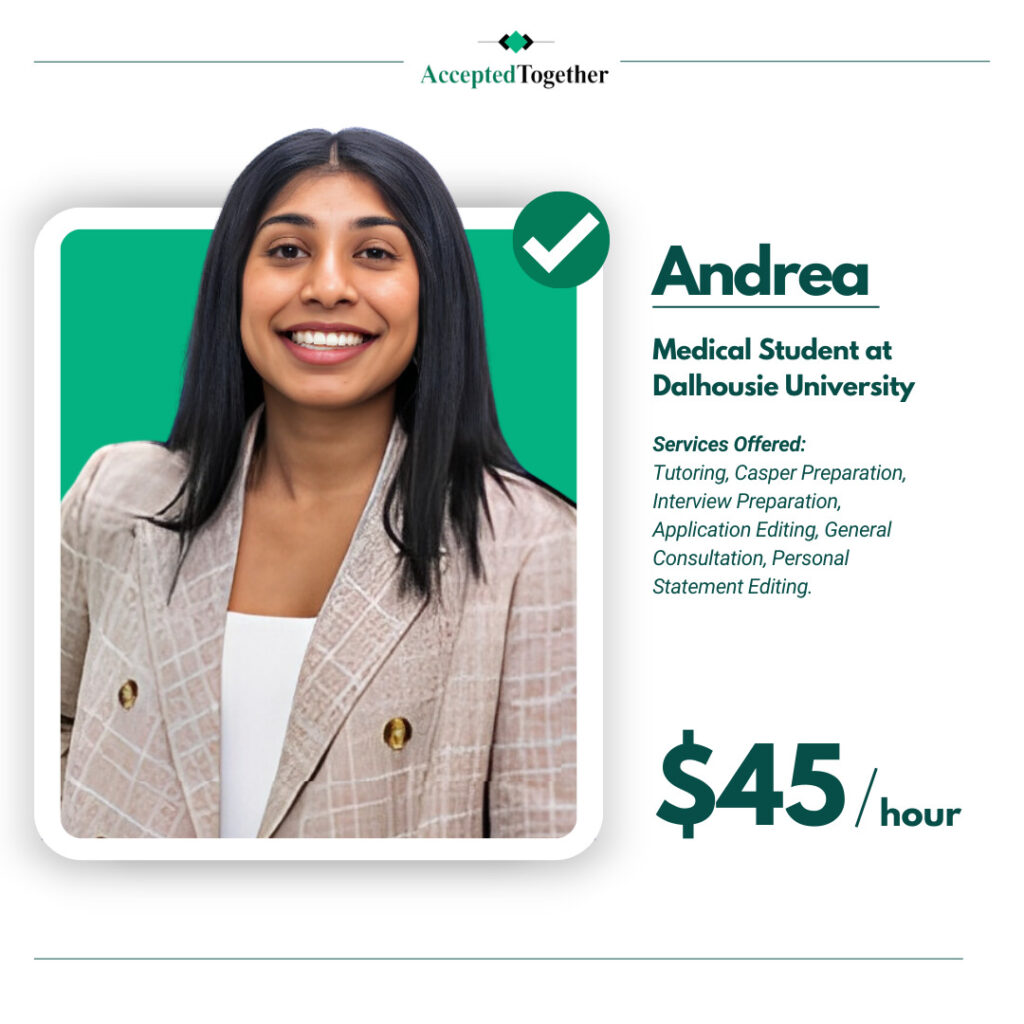Last updated on May 4th, 2025 at 07:51 am
Table of Contents
Introduction

Medical school interviews can be stressful, but knowing what to expect makes a huge difference. traditional and panel interviews remain one of the most common ways schools assess applicants. Whether it’s a casual chat or a structured discussion, these interviews help admissions teams gauge a candidate’s personality, communication skills, and ability to think under pressure. Some schools weigh them heavily in admissions decisions, while others use them to confirm what they already know from an applicant’s file. Either way, solid preparation can put you ahead.
A panel interview usually includes a mix of faculty members, medical students, and sometimes community representatives. Questions may range from personal reflections to ethical scenarios, giving interviewers a chance to test how well candidates articulate their thoughts. Unlike the Multiple Mini Interview (MMI), which moves quickly from one station to another, a panel interview allows for deeper conversations. This format gives applicants more control, but that also means nerves can creep in. A well-prepared response can keep you from rambling or freezing up.
The good news? These interviews are predictable. Schools want to see confidence, self-awareness, and clear reasoning. With the right strategies, you can walk into your interview feeling ready to engage in a meaningful discussion—and leave a lasting impression.
Understanding the Traditional Interview Format
Who’s on the panel?
In a panel interview, you’ll be sitting across from a group of interviewers who may include faculty members, current medical students, residents, and sometimes a community representative. These panelists assess how well you communicate, handle pressure, and fit within their program. Each school structures its panel slightly differently, but most consist of one to four members.
Faculty members on the panel are often deeply involved in medical education and admissions. They look for candidates who demonstrate professionalism, self-awareness, and a clear understanding of why they want to pursue medicine. They may also bring up aspects of your application, such as research experience, clinical exposure, or academic performance, to see if you can speak about them in a meaningful way.
Medical students or residents bring a different perspective. They understand the day-to-day life of being in medical school and may focus on how well you’d integrate into the student body. They might ask about teamwork, handling challenges, or time management to see if you have realistic expectations about medical training.
Some panels include a community representative—someone outside of the medical field. These individuals evaluate interpersonal skills, ethical reasoning, and general likability. Their role is to ensure candidates can connect with people from different backgrounds, which is a key part of patient care.
Before your interview, research the school’s process to understand who might be on your panel. Some programs provide this information in advance, while others don’t. Regardless, expect a mix of perspectives aimed at assessing whether you’ll be a good fit for their institution.
What kinds of questions should you expect?
Questions in a panel interview can vary widely. Some panels take a conversational approach, asking general questions about your background and interests, while others follow a structured format with behavioral or situational questions.
A common category is personal questions. These include “Tell me about yourself,” “Why do you want to be a doctor?” and “What motivates you?” They allow interviewers to see how well you articulate your story and whether you’ve thought deeply about your path to medicine.
Expect behavioral questions that explore past experiences. These follow a format like, “Tell me about a time when you faced a difficult situation,” or “Describe a moment when you had to take on a leadership role.” The goal is to assess how you handle challenges, work in teams, and adapt to new situations. Structuring responses using the SHARE model—Situation, Hindrances, Actions, Results, and Evaluation—helps keep answers focused and easy to follow.
Another common area is ethical questions. You might be asked about patient autonomy, resource allocation, or controversial medical topics. Interviewers aren’t necessarily looking for a “correct” answer but want to see that you can think critically and communicate your reasoning clearly.
Some schools include red flag questions, especially if there’s something in your application that needs further explanation. These might address a lower grade, a gap in education, or a disciplinary issue. Being honest, taking responsibility, and showing how you’ve grown from the experience is key to answering these effectively.
Finally, you may get creative or unconventional questions, such as, “If you could have any superpower, what would it be?” or “How would you describe yourself in three words?” These test your ability to think on the spot and offer a glimpse into your personality.
How is it different from the MMI?
A panel interview differs from Multiple Mini Interviews (MMIs) in several ways. The biggest difference is structure. A panel interview involves sitting with the same group of interviewers for an extended period, typically 30 to 60 minutes. The conversation flows more naturally, allowing follow-up questions and deeper discussions.
In contrast, the MMI consists of short, timed stations where candidates rotate between different assessors. Each station has a unique prompt, which may include ethical dilemmas, role-playing, or problem-solving tasks. The MMI is designed to test a wide range of skills, often under time pressure, whereas a panel interview focus more on sustained conversations and overall personality assessment.
One advantage of a panel interview is that they allow you to guide the discussion to some extent. If an interviewer asks about a particular experience, you can expand on it and connect it to broader themes in your application. In an MMI, responses must be concise due to strict time constraints.
However, panel interviews can also be unpredictable. Because panelists can ask follow-up questions, they may probe deeper into areas where you seem less confident. In an MMI, once a station is over, you move on without worrying about a weak answer affecting the rest of the interview.
Both formats require strong preparation, but a panel interview demand a different strategy. Instead of rapid-fire problem-solving, focus on building strong, structured responses, maintaining composure, and engaging naturally in conversation.
What Schools Are Looking For
Medical schools use panel interview to get a better sense of who you are beyond your application. While grades, test scores, and extracurriculars show your academic readiness, the interview gives schools a chance to evaluate how you think, communicate, and handle unexpected situations. Interviewers are looking for specific qualities that indicate whether you would be a good fit for their program and the medical profession.
Personality and Professionalism
Your resume may highlight your research, clinical experience, and academic achievements, but medical schools also want to know if you have the personality to thrive in a patient-centered career. In a panel interview, your demeanor, how you communicate, and the way you engage with the panelists all play a role in their evaluation.
Professionalism doesn’t mean speaking in a rehearsed or robotic way. It means being respectful, maintaining good eye contact, and demonstrating that you take the interview seriously. Schools are looking for candidates who can interact with a variety of people—patients, peers, supervisors, and hospital staff—while remaining composed and personable.
At the same time, personality matters. Strong candidates show enthusiasm for medicine, genuine interest in the conversation, and a level of self-awareness that allows them to discuss their journey openly. Medical schools want students who will work well in a team and contribute positively to the learning environment. If you appear disinterested, overly rehearsed, or overly defensive in your answers, it can raise concerns about how you might interact with future patients or colleagues.
During the interview, being personable goes a long way. Small things—like smiling when appropriate, showing engagement in the conversation, and responding thoughtfully—help leave a positive impression.
Depth of Insight
One of the main goals of a panel interview is to assess how well you understand your own experiences. Schools don’t just want to hear a list of accomplishments; they want to know what you learned from them and how they shaped your decision to pursue medicine.
For example, if you’re asked about a leadership experience, a strong answer doesn’t just describe what you did—it also explains why the experience was meaningful, how you navigated challenges, and what you would do differently next time. The ability to reflect on past situations and draw meaningful lessons from them is key.
Medical schools also look for self-awareness. If an interviewer asks about your biggest weakness, they’re not trying to trick you—they want to see if you can identify areas for growth and show that you’re working on them. Someone who can admit to struggles but also demonstrate improvement will come across as mature and adaptable.
Insight isn’t just about reflecting on the past. It’s also about demonstrating an understanding of the medical profession. If you mention that you want to be a doctor because you love science, that’s a fine starting point—but you need to go deeper. Schools want candidates who recognize both the rewards and the difficulties of the job. They want to see that you’ve thought about the long hours, the emotional challenges, and the lifelong commitment to learning. Being able to talk about these realities while still showing enthusiasm for the field signals that you’ve done your research and are prepared for the road ahead.
Ability to Handle Pressure
Interviews can be stressful, and a panel interview are no exception. Medical schools pay attention to how you handle difficult or unexpected questions because they want to see how you might react in high-pressure situations as a physician.
Some panelists may challenge your answers, interrupt you, or ask follow-up questions that force you to clarify your thoughts. They do this to see how well you think on your feet. The key is staying composed. If you’re thrown off by a question, take a moment to gather your thoughts rather than blurting out an answer. A brief pause to structure your response is far better than rushing through an unclear explanation.
Handling pressure isn’t just about answering tough questions—it’s also about managing nerves. Some anxiety is normal, but if you’re overly stiff or rehearsed, it can make you seem unapproachable. Interviewers want to see candidates who can engage in a natural conversation even when they’re under scrutiny.
One way to show composure is by maintaining steady eye contact, speaking at a measured pace, and adjusting if an answer isn’t landing well. If an interviewer asks a question you weren’t expecting, take a second to think through your response before speaking. Demonstrating adaptability and clear thinking under pressure leaves a strong impression.
Fit for the School
Every medical school has a unique culture, and a panel interview help admissions teams figure out if you’d be a good addition to their program. Just as you’re evaluating whether a school is the right place for you, they’re trying to determine whether you align with their values, teaching style, and community.
Schools want students who will contribute to their environment—not just academically, but socially and professionally. Some programs emphasize research, while others focus on community service or clinical experience. If you’ve applied to a school known for its commitment to underserved populations, for example, interviewers may want to hear about your experiences with community outreach or patient advocacy.
One of the best ways to demonstrate fit is by showing that you’ve done your research. If you can reference specific aspects of the program—such as mentorship opportunities, curriculum structure, or student organizations—it shows that you’re genuinely interested in what the school offers. A vague answer about why you like a school won’t be as convincing as one that demonstrates knowledge of its values and programs.
It’s also important to be yourself. Schools don’t expect every applicant to be the same, and they’re not just looking for candidates who check every box. They want students who will contribute their unique perspectives and experiences. Being honest about your goals, interests, and motivations helps interviewers see whether you’d be a good match for their program.
Click to see hundreds of consultants who can mentor you:

Preparing for Common Questions
During a panel interview, medical schools use common questions to evaluate how well you understand your experiences, motivations, and values. While some questions seem straightforward, they often require more than just a surface-level answer. Strong responses show self-awareness, critical thinking, and the ability to communicate ideas clearly. Preparing structured responses can help you stay focused and make a strong impression.
Tell me about yourself.
This is one of the most open-ended questions you’ll get in panel interview, and it’s easy to either ramble or give an overly rehearsed response. Schools use this question to see how you introduce yourself, what you prioritize, and how well you organize your thoughts.
A strong response gives a short personal background, highlights key experiences that led you to medicine, and connects to your current goals. Instead of listing achievements, focus on telling a brief story that ties your journey together. Keep it structured but conversational.
For example, you might start with where you grew up or a formative experience that shaped your interest in healthcare. Then, transition into major academic and extracurricular milestones that reinforced your decision to pursue medicine. End by tying everything together with where you are now and what excites you about medical school.
Avoid giving a chronological list of everything on your application. Instead, pick a few key points that give insight into who you are.
Why do you want to be a doctor?
This is a question you should expect in every medical school interview. Schools want to know what drives you to pursue medicine and whether you have thought through this decision carefully. In panel interview, a vague or generic response won’t stand out.
A strong answer includes personal motivation, meaningful experiences, and a clear understanding of what a career in medicine involves. Start by explaining what first sparked your interest. Maybe it was a personal experience with healthcare, a volunteer position, or a class that got you excited about the field. Then, go beyond that and describe specific experiences that confirmed this path.
For example, talk about shadowing a physician and what you learned from seeing their interactions with patients. Or mention a time you worked in a clinical setting and realized the impact of direct patient care. Schools want to see that you’ve had enough exposure to medicine to understand both the rewards and the challenges.
End with why medicine is the right fit for you—not just why you find it interesting, but why you see yourself in this role long term.
What’s your biggest strength and weakness?
In panel interview, this question is meant to assess your self-awareness and ability to grow. The key is to be honest while also showing that you learn from experiences.
For strengths, pick something relevant to medicine and back it up with an example. Instead of just saying, “I’m a good listener,” explain a situation where active listening helped you in a clinical or teamwork setting. Strong responses show how your strengths translate into skills that will help you as a future doctor.
For weaknesses, avoid cliché answers like “I work too hard.” Choose something genuine but not something that would raise concerns about your ability to handle medical school. For example, you might talk about struggling with time management in the past and the steps you took to improve. Schools want to see that you recognize areas for growth and are actively working on them.
How do you handle ethical dilemmas?
Medical schools need to know that their students can think critically about complex issues. Ethical questions in panel interview assess how well you approach difficult decisions while keeping patient care at the center.
A good approach is to use a structured framework. One method is considering the four pillars of medical ethics:
- Autonomy – Respecting a patient’s right to make decisions.
- Beneficence – Acting in the patient’s best interest.
- Nonmaleficence – Avoiding harm.
- Justice – Ensuring fairness in healthcare decisions.
For example, if you’re asked how you would respond to a patient refusing a life-saving treatment, you might first acknowledge their right to make decisions about their health. Then, explain how you would try to understand their reasoning, provide clear information, and explore ways to support their autonomy while ensuring they have all the facts.
Ethical questions don’t always have a “right” answer, but interviewers want to see that you can reason through them logically and communicate your thought process clearly.
Why this medical school?
Schools want students who are genuinely excited about their program and understand what makes it unique. In a panel interview, a generic answer won’t be convincing. Instead of just listing the school’s strengths, focus on how those strengths align with your goals.
Start by mentioning specific aspects of the school that stand out to you. This could be their curriculum structure, research opportunities, clinical training, or community involvement. Be specific—saying, “I love that your school values diversity” is less compelling than saying, “I appreciate that your school has a mentorship program for first-year students, which aligns with my interest in peer support.”
Then, connect those aspects to your background and interests. If the school has a strong global health program and you’ve done research or volunteer work in that area, explain why that opportunity excites you. Schools want to see that you’ve done your research and can explain why their program is the right fit for you.
Finally, tie it back to what you would contribute. Schools look for students who will be active members of their community, so showing that you’re eager to engage with specific opportunities makes your answer more compelling.
Structuring Strong Responses with the SHARE Model
In a panel interview, being able to structure your answers well is just as important as the content itself. A clear, concise response shows that you can communicate effectively and think in an organized way. One useful approach is the SHARE model, which helps structure responses to behavioral and situational questions. This method keeps answers focused while ensuring you highlight key details in a logical sequence.
Each part of the SHARE model—Situation, Hindrances, Actions, Results, and Evaluation—plays a role in making your response more compelling. Using this framework ensures that you answer the question fully without going off track or providing unnecessary details.
S – Situation
The first part of your response sets the stage. When asked a behavioral question in a panel interview, briefly describe the context of the experience you are sharing. The key here is to be specific but not overly detailed.
For example, if you are asked about a time you handled a leadership challenge, you don’t need to provide an entire backstory. Instead, focus on what is relevant to the situation. Keep it clear by answering: Where were you? Who was involved? What was happening?
A strong response might begin like this:
“During my final year of undergrad, I was working on a group research project for a public health course. Our team had four members, and we were tasked with analyzing community health data to propose an intervention. As the deadline approached, we realized that our data analysis was incomplete, and team communication had started to break down.”
This approach gives just enough detail to help the interviewer understand the context without losing their attention.
H – Hindrances
Once you’ve described the situation, highlight the challenges or obstacles you encountered. Medical schools use panel interviews to assess how well you handle setbacks, so this part of your response should clearly define what made the situation difficult.
Challenges could be related to teamwork, time constraints, communication breakdowns, or ethical dilemmas. Whatever the issue, make sure it is relevant to the question and connects naturally to the actions you took.
For instance, expanding on the previous example:
“One of the biggest challenges was that two team members had conflicting schedules and struggled to attend meetings. As a result, different parts of the project were being completed without much coordination. Additionally, the person handling our data analysis was unfamiliar with the statistical software we needed to use, so we were behind schedule.”
This section should clearly show that a problem existed and needed to be addressed. Avoid exaggerating the difficulty, but make it clear why the situation required a solution.
A – Actions
This is where you explain what steps you took to address the problem. In panel interviews, schools want to see that you can take initiative, think critically, and contribute to problem-solving.
Your response should focus on your role in the situation, even if you worked as part of a team. Be specific about what you did, rather than what others did. Instead of saying, “We decided to change our approach,” clarify your personal contributions.
For example:
“I reached out to each team member individually to understand their availability and concerns. I then created a shared calendar with deadlines and assigned roles based on everyone’s strengths. To help with the data analysis issue, I spent extra time reviewing tutorials on the software and scheduled a meeting to walk the team member through the process. This ensured that we could move forward with our research instead of falling further behind.”
This section should highlight initiative, problem-solving, and adaptability—all qualities that medical schools look for.
R – Results
After describing the actions you took, explain the outcome. Schools use panel interviews to assess whether you can reflect on the impact of your decisions. The result doesn’t always have to be a perfect resolution, but it should show that your actions had a meaningful effect.
Good responses are specific. Instead of saying, “It all worked out,” provide measurable or observable results.
“With the new system in place, we were able to finish our project on time and present a well-organized analysis. The team member working on data analysis became more confident with the software, and we received positive feedback from our professor on our teamwork and presentation skills.”
This section reinforces the idea that your actions led to progress and that you played a key role in making that happen.
E – Evaluate
The last part of the SHARE model focuses on reflection. In panel interviews, interviewers want to know if you can analyze past experiences and apply what you learned.
This is your chance to show personal growth. What did you take away from the situation? How has it influenced the way you approach similar challenges now?
For example:
“This experience taught me the importance of proactive communication in group work. Since then, I’ve made a habit of setting clear expectations early in any team project. It also reinforced the value of stepping up when a teammate needs support. I know that in medicine, strong communication and teamwork are essential, and I’ve continued to build on these skills in my clinical and academic experiences.”
This final section wraps up your response by showing that you not only handled the situation well but also gained insights that will help you in the future.
Mock Interviews: The Key to Feeling Prepared
Practicing ahead of time is one of the most effective ways to improve your performance in a panel interview. While knowing potential questions is helpful, the real challenge is delivering clear, structured answers under pressure. Mock interviews allow you to work through common questions, refine your responses, and build confidence before the real thing.
The best way to prepare is to simulate the interview setting as closely as possible. This means practicing out loud, working with a partner who can play the role of the panel, keeping track of your timing, and reviewing your performance.
Practice out loud
Thinking through an answer in your head is different from actually saying it out loud. In a panel interview, your responses need to flow naturally, without long pauses or filler words. Practicing out loud helps you get comfortable forming complete thoughts and speaking in a clear, confident manner.
Start by choosing a set of common interview questions and answering them verbally. Pay attention to your wording and structure. If you find yourself rambling or struggling to get to the point, adjust your approach. The goal is to sound natural and concise while still covering the important details.
It can also help to practice in front of a mirror. This allows you to notice your facial expressions, posture, and body language. Making eye contact and maintaining an open, engaged posture are just as important as delivering a strong verbal response.
To simulate real interview conditions, practice answering questions without reading from notes. In a panel interview, you won’t have a script in front of you, so you need to be able to speak comfortably without relying on memorization.
Get a friend or mentor to play the panel
Practicing alone is useful, but having someone else ask you questions can take your preparation to the next level. In a panel interview, you’ll need to engage with multiple people, think on your feet, and respond to follow-up questions. A friend, mentor, or colleague can help create a more realistic experience.
Ask them to play the role of an interviewer by maintaining eye contact, listening carefully, and reacting naturally to your answers. Have them take notes on things like clarity, pacing, and body language. If possible, choose someone with experience in professional or academic interviews who can give structured feedback.
You can also have them ask follow-up questions. In a panel interview, panelists will often probe deeper into your answers. If your response seems unclear or too broad, they might ask for more details or challenge your reasoning. Practicing with someone who can push you to refine your answers will make it easier to handle these moments during the real interview.
If you don’t have someone available, consider joining an online study group or working with classmates who are also preparing for interviews. A fresh perspective can help identify areas for improvement that you might not notice on your own.
Time yourself
One common mistake in a panel interview is giving answers that are either too short or too long. A well-structured response should be detailed enough to fully answer the question but concise enough to keep the interviewer engaged.
To get a sense of timing, practice answering questions while using a stopwatch. Most responses should fall within the one- to two-minute range, depending on the complexity of the question.
If your answers are too short, you may not be providing enough depth or context. Look for ways to expand on your response by including specific examples or connecting your experiences to your motivations for medicine.
If your answers are too long, focus on getting to the point more quickly. Avoid unnecessary details or repeating the same idea in different ways. Practicing with a time limit helps train you to be more intentional with your words and structure your responses efficiently.
For particularly challenging questions, you can practice a three-step approach:
- Take a brief pause before answering to organize your thoughts.
- Deliver a clear, structured response within a reasonable time frame.
- If needed, wrap up with a quick summary to reinforce your main point.
Timing yourself regularly will help you find a comfortable speaking pace and prevent you from feeling rushed or disorganized during the real interview.
Record and review
Recording yourself during practice sessions can be one of the most effective ways to improve your interview performance. Watching or listening to a recording allows you to evaluate your tone, clarity, and body language in a way that’s hard to do in the moment.
Set up a camera or use your phone to record a full-length mock interview. Pay attention to key areas such as:
- Pacing – Are you speaking too quickly or too slowly?
- Clarity – Are your answers structured and easy to follow?
- Filler words – Do you use too many “um,” “like,” or “you know” phrases?
- Body language – Are you making eye contact and maintaining a confident posture?
Listening to yourself can be uncomfortable at first, but it helps you catch small habits that might not be obvious while speaking. If you notice issues, adjust your approach and try again. Over time, this process helps refine your delivery and builds confidence.
If possible, have someone else watch your recordings and provide feedback. They may notice things that you overlooked, such as lack of enthusiasm in your tone or a distracting habit like fidgeting with your hands.
The more you review and adjust, the more polished and natural your responses will become. Practicing in this way helps you walk into your panel interview knowing exactly how you sound and present yourself.
Handling the Pressure on Interview Day
A panel interview can be nerve-wracking, but how you handle pressure can make a big difference in how you come across to the panel. Admissions committees aren’t just evaluating your answers; they’re also paying attention to how you respond to challenging questions, unexpected follow-ups, and the overall stress of the situation. The key is to stay composed, maintain good communication, and show that you can think clearly under pressure.
While preparation is important, managing nerves in the moment is just as critical. Being aware of how you speak, how you present yourself, and how you navigate difficult moments can help you appear more confident and engaged.
Keep a steady pace
Speaking too fast is one of the most common mistakes in a panel interview. When nerves kick in, it’s easy to rush through answers, trying to get everything out at once. This can make responses harder to follow and increase the chances of losing track of what you were saying.
The best way to keep a steady pace is to be mindful of your breathing and speak at a natural rhythm. If you find yourself speeding up, make a conscious effort to slow down. One way to practice this is by timing your responses during mock interviews to ensure you’re taking enough time to explain your points without rambling.
Another helpful technique is to focus on speaking in short, structured sentences. Instead of cramming too much information into one long response, break it up into smaller points. This makes your answers clearer and easier for the panel to follow.
If you’re asked a complex question, avoid the instinct to immediately start speaking. Taking a second to organize your thoughts before answering helps you maintain a controlled pace and prevents you from getting ahead of yourself.
Pause if needed
In a panel interview, it’s completely fine to take a brief pause before answering a question. Many candidates worry that silence will make them seem unprepared, but rushing into a response can lead to disorganized or unclear answers.
Pausing for a moment before speaking allows you to gather your thoughts and ensures that your answer is well-structured. A short break of a few seconds is completely natural in a conversation and gives you a moment to mentally organize what you want to say.
If you find yourself in the middle of an answer and feel like you’re losing your train of thought, don’t panic. Instead, take a breath, collect your thoughts, and continue. It’s better to take a second to refocus than to keep talking in circles.
One way to practice this is by recording yourself answering questions and listening for moments where a pause would improve clarity. Over time, you’ll become more comfortable with using short pauses to your advantage.
Maintain eye contact
Eye contact is an important part of non-verbal communication, and it plays a big role in how you come across in a panel interview. Good eye contact signals confidence, engagement, and sincerity, while avoiding eye contact can make you seem unsure or disengaged.
If your interview panel consists of multiple people, make an effort to address each panelist rather than focusing on just one person. This creates a sense of connection and makes your responses feel more natural.
At the same time, eye contact should feel natural, not forced. Staring too intensely can come across as uncomfortable, while looking away too often might suggest nervousness. The goal is to maintain steady but relaxed eye contact throughout the conversation.
If you’re unsure about how much eye contact to maintain, practice with a friend or mentor before your interview. They can give feedback on whether your eye contact feels balanced and natural.
Stay positive
Maintaining a positive mindset during a panel interview can help you come across as more confident and composed. Even if a question is challenging, approach it with a mindset that focuses on problem-solving rather than frustration or hesitation.
If you’re asked about a weakness, failure, or red flag in your application, acknowledge the challenge but shift the focus toward what you learned from it. Schools aren’t looking for perfect candidates—they want applicants who can reflect on experiences, adapt, and improve.
For example, if you’re discussing a time you struggled with a difficult subject, don’t dwell on the difficulty itself. Instead, highlight the steps you took to improve and how the experience made you a better student.
Another part of staying positive is handling follow-up questions with patience. Some panelists may ask additional questions to test how well you think under pressure. If this happens, avoid getting defensive. Instead, take it as an opportunity to clarify your answer and demonstrate your ability to stay composed.
Be yourself
One of the most important things to remember in a panel interview is that admissions committees want to get to know you—not a rehearsed version of what you think they want to hear. While preparation is essential, your answers should still feel natural and authentic.
Trying too hard to sound perfect or overly polished can make responses seem robotic. Instead, focus on delivering answers in a way that reflects your real experiences, values, and motivations. Schools are looking for candidates who can engage in thoughtful conversations, not just recite memorized responses.
A good way to balance preparation with authenticity is to practice answering questions in different ways. This helps you become comfortable discussing your experiences without feeling like you’re reading from a script.
Most importantly, trust that your application and experiences are strong enough to carry you through the interview. Being genuine, maintaining composure, and approaching the interview as a conversation rather than a test will leave a stronger impression than trying to say exactly what you think the panel wants to hear.
Check out what students are saying about our consultants:


Conclusion
A panel interview is more than just answering questions—it’s about how well you communicate, stay composed, and engage in conversation. Medical schools want to see that you can think on your feet, express ideas clearly, and handle pressure with confidence. Preparation helps, but staying flexible and genuine during the interview matters just as much.
Practicing structured responses using models like SHARE can keep your answers focused. Mock interviews, recording yourself, and working with a mentor help refine your delivery and catch areas that need improvement. On interview day, managing your pacing, using pauses effectively, and maintaining good eye contact will make a strong impression. Panelists aren’t just listening to what you say; they’re paying attention to how you say it.
Staying positive, even when faced with tough questions, shows resilience. Being honest about challenges or weaknesses while demonstrating growth gives a more authentic picture of who you are. Schools aren’t expecting rehearsed perfection—they want to know if you can communicate thoughtfully and adapt to new situations.
A panel interview is an opportunity to show medical schools why you belong in their program. Approach it as a conversation, not a test, and let your preparation guide you to a confident, engaging discussion.
Frequently
Asked Questions
A panel interview is a structured conversation where a panel of two to four interviewers evaluates a candidate’s suitability for medical school. Interviewers typically include faculty members, medical students, residents, and sometimes a community representative. Unlike the Multiple Mini Interview (MMI), which consists of multiple short stations, a panel interview allows for in-depth discussions and follow-up questions, making it a more fluid and conversational experience.
Questions in panel interviews can cover personal background, ethical dilemmas, behavioral scenarios, and red flags in an application. You may be asked about your motivation for medicine, a time you faced a challenge, or how you would handle a difficult patient interaction. Some questions are designed to assess critical thinking and adaptability, so being prepared for a range of topics is essential.
Using a structured approach like the SHARE model can help keep answers clear and organized. Start with the Situation by briefly describing the context, then explain the Hindrances or challenges you faced. Follow up with the Actions you took, the Results of those actions, and conclude with an Evaluation of what you learned from the experience. This method ensures your answer is well-structured and directly addresses the question.
Mock interviews are one of the best ways to prepare. Practicing out loud, working with a mentor or friend who can act as an interviewer, and recording your responses can help improve clarity and confidence. Additionally, timing yourself while answering questions ensures your responses are neither too short nor too long, making your communication more effective during the actual interview.
If you’re unsure about a question, take a brief pause to collect your thoughts before responding. It’s better to take a few seconds to organize your answer than to start speaking without direction. If necessary, acknowledge that it’s a challenging question, outline your thought process, and provide a reasoned response rather than leaving the question unanswered.
Body language plays a key role in making a positive impression. Maintaining steady but natural eye contact, sitting with good posture, and using subtle hand gestures can help convey confidence and engagement. Avoid nervous habits like fidgeting or excessive movement, as these can distract from your answers.
Panelists may ask follow-up questions to test your reasoning or challenge parts of your answer. Instead of becoming defensive, take the opportunity to expand on your response and clarify your thought process. Responding calmly and thoughtfully shows that you can handle pressure and think critically in real-time.
Common mistakes include speaking too fast, giving answers that are too vague or overly rehearsed, and failing to engage with all interviewers. Another pitfall is not tailoring answers to the specific school—researching the program beforehand and referencing aspects that align with your interests will make your responses more compelling. Staying natural, structured, and confident can help avoid these issues.
Most responses should be between one to two minutes long, depending on the complexity of the question. If an answer is too short, it may lack depth, and if it’s too long, it may lose focus. Practicing with a timer can help ensure that your responses are well-balanced and to the point.
After your interview, take notes on key points discussed, especially anything that stood out or surprised you. If the school allows it, sending a thank-you email to your interviewers can be a polite way to express appreciation and reinforce your interest in their program. Avoid overanalyzing your performance—focus on what you learned from the experience and apply that knowledge to future interviews.







